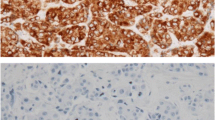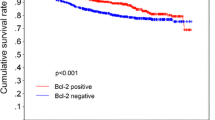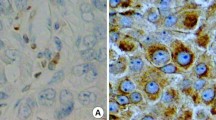Abstract
We studied the association of the immunohistochemical bcl-2 expression in Libyan breast cancer with clinicopathological variables and patient outcome. Histological samples from 170 previously untreated primary Libyan breast carcinoma patients were examined. In immunohistochemistry, the NCL-l-bcl-2-486 monoclonal antibody was used. Positive expression of bcl-2 was found in 106 patients (62.4 %). The bcl-2 expression was significantly associated with estrogen receptor (p < 0.0001) and progesterone receptor positive tumors (p = 0.002), small tumor size (p < 0.0001), low tumor grade (p < 0.0001), negative axillary lymph nodes (p < 0.0001), early stages (p = 0.001), and low risk of metastasis (p < 0.0001). Positive expression was also associated with older patients (>50 years; p = 0.04). Histological subtypes and family history of breast cancer did not have significant relationship with bcl-2. Patients with positive expression of bcl-2 had lower recurrence rate than bcl-2-negative patients and better survival after median follow-up of 47 months. Patients with high bcl-2 staining were associated with the best survival. The role of bcl-2 as an independent predictor of disease-specific survival was assessed in a multivariate survival (Cox) analysis, including age, hormonal status, recurrence, histological grade, and clinical stage variables. Bcl-2 (p < 0.0001) and clinical stage (p = 0.016) were independent predicators of disease-specific survival. For analysis of disease-free survival, the same variables were entered to the model and only bcl-2 proved to be an independent predictor (p = 0.002). Patients with positive expression of bcl-2 were associated with low grade of malignancy, with lower recurrence rate, with lower rate of death, and with longer survival time. Bcl-2 is an independent predictor of breast cancer outcome, and it provides useful prognostic information in Libyan breast cancer. Thus, it could be used with classical clinicopathological factors to improve patient selection for therapy.



Similar content being viewed by others
References
Abussa A. Hospital cancer registry annual report. Sabratha, Libya: African Oncology Institute; 2007. p. 18–20.
El Mistiri M, Verdecchia A, Rashid I, El Sahli N, El Mangush M, Federico M. Cancer incidence in eastern Libya: the first report from the Benghazi Cancer Registry, 2003. Int J Cancer. 2007;120(2):392–7.
Abulkhair O, Saghir N, Sedky L, et al. Modification and implementation of NCCN guidelines on breast cancer in the Middle East and North Africa region. J Natl Compr Canc Netw. 2010;8 Suppl 3:S8–S15.
Stapleton JM, Mullan PB, Dey S, et al. Patient-mediated factors predicting early- and late-stage presentation of breast cancer in Egypt. Psycho-Oncology. 2011;20(5):532–7.
Boder J, Abdalla F, Elfageih M, et al. Breast cancer patients in Libya: comparison with European and central African patients. Oncology Letters. 2011;2:323–30.
Galea MH, Blamey RW, Elson CE, Ellis IO. The Nottingham Promostic Index in primary breast cancer. Breast Cancer Res Treat. 1992;22:207–19.
Kumar R, Vadlamudi RK, Adam L. Apoptosis in mammary glande and cancer. Endocrine-Related Cancer. 2000;7:257–69.
Krajewski S, Krajewski M, Turner BC, et al. Prognostic significance of apoptosis regulators in breast cancer. Endocrine-Related Cancer. 1999;6:29–40.
Arun B, Kilic G, Yen C, et al. Correlation Bcl-2 and p53 expression in primary breast tumors and corresponding metastatic lymph nodes. Cancer. 2003;98(12):2554–9.
Adms JM, Cory S. The Bcl-2 protein family: arbiters of cell survival. Science. 1998;28:1322–6.
Hermine O, Hajoun C, Lepage E, et al. Prognostic significance of bcl-2 protein expression in aggressive non-Hodgkin's lymphoma. Group d Etude des Lymphomes de l Adulte (GELA). Blood. 1996;87:265–72.
Callagy GM, Pharoah PD, Pinder SE, et al. Bcl-2 is a prognostic marker in breast cancer independently of the Nottingham Prognostic Index. Cancer Res. 2006;12:2468–75.
Milano A, Lago LD, Sotiriou C, et al. What clinicians need to know about antioestrogen resistance in breast cancer therapy? Eur J Cancer. 2006;42:2696–705.
Lipponen P, Pietilainen T, Kosma VM, Aaltomaa S, Eskelinen M, Syrjanen K. Apoptosis suppressing protein bcl-2 is expressed in well-differentiated breast carcinomas with favourable prognosis. J Pathol. 1995;177:49–55.
Jager JJ, Jansen RLH, Arends JW. Clinical relevance of apoptosis markers in breat cancer not yet clear. Apoptosis. 2002;7:361–5.
Daidone MG, Luisi A, Veneroni S, et al. Clinical studies of bcl-2 and treatment benefit in breast cancer patients. Endocr Relat Cancer. 1999;6:61–8.
Le MG, Mathieu M-C, Douc-Rasy S, et al. c-myc, p53 and bcl-2, apoptosis-related genes in infiltrating breast carcinomas: evidence of a link between bcl-2 protein over-expression and a lower risk of metastasis and death in operable patients. Int J Cancer. 1999;84:562–7.
Silvestrini R, Benini E, Veneroni S, et al. P53 and bcl-2 expression correlated with clinical outcome in series of node-positive breast cancer patients. J Clin Oncol. 1996;14(5):1604–10.
Callagy GM, Webber MJ, Pharoah PD, Caldas C. Met-analysis confirm BCL2 is an independent prognostic marker in breast cancer. BMC Cancer. 2008;8:153.
Dawson S-J, Makretsov N, Blows FM, et al. BCL2 in breast cancer: a favourable prognostic marker across molecular subtypes and independent of adjuvant therapy received. Br J Cancer. 2010;103:668–75.
AJCC: 5th Edition AJCC Cancer Staging Manual. Philadelphia: Lippincott-Raven; 1997.
Allred DC, Harvey JM, Berardo M, Clark GM. Prognostic and predictive factors in breast cancer by immunohistochemical analysis. Mod Pathol. 1998;11:155–68.
Zhang G-J, Kimijima I, Abe R, et al. Correlation between the expression of apoptosis-related bcl-2 and p53 oncoprotein and the carcinogenesis and progression of breast cancer. Clin Cancer Res. 1997;3:2329–35.
Sorlie T, Perou CM, Tibshirani R, Eystein Lonning P, Borresen-Dale AL, et al. Gene expression patterns of breast carcinomas distinguish tumor subclasses with clinical implication. Proc Natl Acad Sci USA. 2001;98:10869–74.
Trere D, Montanaro L, Ceccarelli C, et al. Prognostic relevance of a novel semiquantitative classification of Bcl3 immunohistochemical expression in human infiltrating ductal carcinomas of the breast. Annals Oncolog. 2007;18(6):1004–14.
Nadler Y, Camp RL, Giltnane JM, et al. Expression patterns and prognostic value of Bag-1 and Bcl-2 in breast cancer. Breast Cancer Res. 2008;10(35):1186.
Van Slooten HJ, Clahsen PC, van Dierendonck JH, et al. Expression of bcl-2 in node-negative breast cancer is associated various prognostic factors, but does not predict response to oneccourse of perioperative. Br J Cancer. 1996;74:78–85.
Bottini A, Berruit A, Bersiga A, et al. p53 but not bcl-2 immunostaining is predictive of poor clinical complete response to primary chemotherapy in breast cancer. Clin Cancer Res. 2000;6:2751–8.
Tang S-C, Jessalyn B, Murphy S, et al. BAG-1 expression correlates with Bcl-2, p53, differentiation, estrogen and progesterogen receptors in invasive breast carcinoma. Breast Cancer Res Treat. 2004;84:203–13.
Kroger N, Milde-Langosch K, Iethof S, et al. Prognostic and predictive effects of immunohistochemical factors in high-risk primary breast cancer patients. Clin Cancer Res. 2006;12(1):159–68.
Malamou-Mitsi V, Gogas H, Dafni U, et al. Evaluation of the prognostic and predictive value of p53 andBcl-2 in breast cancer patients participating in a randomized study with dose-dense sequential adjuvant chemotherapy. Annals of Oncol. 2006;17(10):1504–11.
Zinkel S, Gross A, Yang E. Bcl-2 family in DNA damage and cell cycle control. Cell Death Differ. 2006;13:1351–9.
Gee JM, Robertson JRR, Ellis IO. Immunocytochemical localization of Bcl-2 protien in human breast cancers and its relationship to a series of prognostic markers and response to endocrine therapy. Int J Cancer. 2006;5:619–28.
Freedman R, Winer E. Adjuvant therapy for menopusal women with endocrine-sensetive breast cancer. Breast. 2010;19:69–75.
Linke SP, Bremer TM, Herold CD, et al. A multimarker model to predict outcome in tamoxifen-treated breast cancer patients. Clin Canc Res. 2006;15:1175–83.
Kymionis GD, Konstadoulakis MM, Dimitrakakis CE, et al. Can expression of apptosis genes, bcl-2 and bax, predict survival and responsiveness to chemotherapy in node-negative breast cancer patients? Surg Res. 2001;99(2):161–8. Abstract.
Hun Lee K, Ah lm S, Youn Oh D, et al. Progmostic significance of Bcl-2 expression in stage lll breast cancer patients who had receivef doxorubicin and cyclophosphamide followed by paclitaxel as adjuvant chemotherapy. BMC Cancer. 2007;7:63–70.
Koman IE, Gurova KV, Kwek SS, et al. Apoptosis inhibitor as a suppressor of tumor progression: expression of Bcl-2 eliminates selective advantages for p53-deficient cells in the tumor. Canc Biol Ther. 2002;1(1):39–44.
Reed JC, Miyashita T, Takayama S, et al. Bcl-2 family proteins: regulators of cell death involved in the pathogenesis of cancer and resistance to therapy. J Cell Biochem. 1996;60:23–32.
Jaattela M, Benedict M, Tewari M, Shayman JA, Dixit VM. Bcl-x and Bcl-2 inhibit TNF and Fas-induced apoptosis and activation of phospholipase A2 in breast cancer cells. Oncogene. 1995;10:2297–305.
Song RX, Mor G, Naftolin F, et al. Effect of long-term estrogen deprivation on apoptotic response of breast cancer cells to 17 beta-estradiol. J Natl Cancer Inst. 2001;93:1714–23.
Jordan VC, Liu H, Dardes R. Re: Effect of long-term estrogen deprivation on apoptotic response of breast cancer cells to 17 beta-estradiol and the two faces of Janus: sex steroids as mediators of both cell proliferation and cell death. J Natl Cancer Inst. 2002;94:1173–5.
Teixeira C, Reed JC, Pratt MA. Estrogen promotes chemotherapeutic drug resistance by a mechanism involving Bcl-2 proto-oncogene expression in human breast cancer cells. Cancer Res. 1995;55:3902–7.
Zhang GJ, Tsuda H, Adachi I, Fukutomi T, Yammamoto H, Hirohashi S. Prognostic indicators for breast cancer patients with one to three regional lymph node metastase, with special reference to alteration in expression levels of bcl-2, p53 and c-erb B-2 protiens. Jpn. J Clin. 1997;27:371–7.
Bukhoim IR, Bukholm G, Nesland JM. Reduced expression both Bax and Bcl-2 is idependently associated with lymph node metastasis in human breast carcinomas. APMIS. 2002;110:214–20.
Alis Dema, Simona Dragan, Elena Lazar, Danina Munteanu, Sorina Taban, Codruta Lzureanu, T. Nicola, S. Dema. Bcl-2 expression in primary breast carcinomas: correlation with other prognostic factors. Nr. 1-2/2008; pp. 65–71.
Daidone MG, Coradini D, Martelli G, et al. Primary breast cancer in elderly women: biological profile and relation with clinical outcome. Crit Rev Oncol Hemat. 2003;45:313–25.
Yu B, Sun X, Hong-yan S, et al. J Exp Clin Res. 2010;29:107.
Ermiah E, Abdala F, Buhmeida A, et al. Prognostic significance of DNA image cytometry in Libyan breast cancer. Oncology. 2012;83:165–76.
Jalava P, Collan Y, Kuopio T, Juntti-patinen L, Kronqvist P. Bcl-2 immunostaining: a way to finding unresponsive postmenopausal N + breast cancer patients. Anti Cancer Res. 2000;20:1213–20.
Olopade OI, Fakenthal JD, Dunston G, et al. Breast cancer genetics in African Americans. Cancer. 2003;97:236–45.
Loo LW, Wang Y, Flynn EM, et al. Genome-wide copy number alteration in subtypes of invasive breast cancers in young white and African Americans women. Breast Canc Res Treat. 2011;127:297–308.
Acknowledgments
The authors acknowledge the Libyan Health Ministry for financing the visit of Dr. Ermiah to the Departments of Pathology and Oncology, University of Turku, and Turku University Hospital, Finland. We also wish to thank the National Oncology Institute, Sabratha, Libya for support in collecting the data and providing the research facilities.
Conflict of interest
None
Author information
Authors and Affiliations
Corresponding author
Rights and permissions
About this article
Cite this article
Ermiah, E., Buhmeida, A., Khaled, B.R. et al. Prognostic value of bcl-2 expression among women with breast cancer in Libya. Tumor Biol. 34, 1569–1578 (2013). https://doi.org/10.1007/s13277-013-0687-1
Received:
Accepted:
Published:
Issue Date:
DOI: https://doi.org/10.1007/s13277-013-0687-1




